- Like
- Digg
- Del
- Tumblr
- VKontakte
- Buffer
- Love This
- Odnoklassniki
- Meneame
- Blogger
- Amazon
- Yahoo Mail
- Gmail
- AOL
- Newsvine
- HackerNews
- Evernote
- MySpace
- Mail.ru
- Viadeo
- Line
- Comments
- Yummly
- SMS
- Viber
- Telegram
- Subscribe
- Skype
- Facebook Messenger
- Kakao
- LiveJournal
- Yammer
- Edgar
- Fintel
- Mix
- Instapaper
- Copy Link
Read Part 1 here. — Read Part 3 here. Read Part 4 here. Read Part 5 here.
No Surprise, American Chemistry Council Says Bring It On
In a May 18, 2017 press release and report, the American Chemistry Council (ACC) opines: “The Appalachian region is an ideal location for the emergence of a second major petrochemical manufacturing hub in the United States, offering benefits such as proximity to abundant NGL (natural gas liquids) resources from the Marcellus/Utica and Rogersville Shale formations.” ACC reckons these shale gas deposits “could feed at least half a dozen world-scale petrochemical complexes in addition to a number of smaller facilities.”
The American Chemistry Council report says that at least five natural gas liquids cracker complexes would be needed to fully realize the petrochemical potential in the four-state Ohio River Valley region extending from southwest PA to Catlettsburg, KY (several miles west of Huntington, WV). Their analysis assumes that 90% of the plastic resin products from the five hoped-for crackers would be shipped outside of the Appalachian region. This would include exports to countries all over the globe.
Royal Dutch Shell has already received permits to build a cracker complex in Monaca, PA. Two other crackers are proposed, but not yet permitted. A Thai company wants to build a cracker complex in Belmont County OH, and two Brazilian companies want to build one near Parkersburg, WV. (We at OVEC are painfully aware of how difficult it is to force U.S.-based companies to comply with coal mining pollution laws; trying to influence foreign companies would be even harder!)
But We Need Your Money and Your Acquiescence to Bring it On
Before this “world class” Ohio River Valley petrochemical complex could come to fruition, several things are necessary. Construction of the Appalachian Storage Hub would cost around $10 billion, which the American Chemistry Council says would require a public-private partnership, with the financial backing of the private sector, as well as funding from federal and state governments. This means that our tax dollars would be necessary for these developments that would bring huge increases in global warming emissions, as well as all kinds of dangers to public health, from chemical emissions, to potential pipeline explosions.
The Appalachian Storage Hub would also necessitate that government develop “appropriate policies and permitting practices,” according to the ACC report. To those of us at OVEC who have been decoding industry-speak for decades, what this means is companies would demand lenient permitting rules and lax pollution requirements.
Plus, we would expect a behind-the-scenes agreement with state and federal regulators that pollution enforcement would not be a priority. It is no secret that WV and other states have widely ignored pollution laws in their “oversight” of mountaintop removal coal mining, leaving some counties in southwestern WV and eastern Kentucky as some of the poorest and sickest counties in the nation. Surely fracking and pipeline industry officials figure that they can expect the same degree of cooperation from government officials.
Read Part 3 here.
Want to join OVEC’s efforts on the issue of the proposed Appalachian Storage Hub? Contact us at info@ohvec.org or 304-522-0246.










